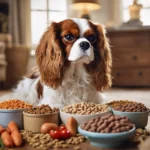Feeding your King Charles Cavalier the right diet is one of the most important steps in ensuring their health and happiness. Cavaliers are known for their gentle temperament, active lifestyle, and sensitive health needs, so it’s essential to select food that meets their specific nutritional requirements. Here are some tips to help you choose the healthiest food for your beloved Cavalier.
1. Understand Nutritional Needs
Cavaliers require a balanced diet that includes:
- Protein: High-quality protein sources like chicken, turkey, or fish support muscle maintenance and overall health.
- Healthy Fats: Fats, such as omega-3 and omega-6 fatty acids, promote a shiny coat and healthy skin.
- Carbohydrates: Whole grains, sweet potatoes, or peas provide energy, but should be included in moderation.
- Vitamins and Minerals: Essential for a strong immune system and proper development.
Look for foods labeled as “complete and balanced,” which meet the Association of American Feed Control Officials (AAFCO) standards.
2. Choose High-Quality Ingredients
Opt for dog food that lists whole meats (like chicken or beef) as the first ingredient. Avoid fillers such as corn, wheat, or soy, which provide little nutritional value and can trigger allergies in some Cavaliers.
3. Consider Your Cavalier’s Age and Activity Level
- Puppies: Choose puppy food rich in calories and nutrients to support growth and development.
- Adults: Feed a balanced diet that maintains their weight and meets their energy needs.
- Seniors: Senior Cavaliers may benefit from food lower in calories but enriched with joint-supporting ingredients like glucosamine.
4. Avoid Common Allergens
Cavaliers are prone to food sensitivities, so avoid foods containing artificial preservatives, colors, or by-products. If your dog shows signs of allergies—such as itching or digestive issues—consider switching to a limited-ingredient or hypoallergenic formula.
5. Wet vs. Dry Food
- Dry Food (Kibble): Convenient and helps maintain dental health, but ensure it’s made with high-quality ingredients.
- Wet Food (Canned): Hydrating and more palatable for picky eaters but may require extra dental care.
- Combination Feeding: Mixing wet and dry food can provide the benefits of both.
6. Portion Control and Feeding Schedule
Cavaliers are prone to obesity, so it’s important to feed them the correct portion size based on their weight and activity level. Divide their daily food intake into two or three smaller meals to prevent overeating and reduce the risk of gastrointestinal issues.
7. Consider Special Diets
- Weight Management: If your Cavalier is overweight, look for a weight-control formula.
- Joint Health: Foods with added glucosamine and chondroitin can support joint health in active or aging Cavaliers.
- Heart Health: Since Cavaliers are prone to heart conditions, consult your vet about diets with taurine and other heart-supporting nutrients.
8. Consult Your Veterinarian
Always involve your veterinarian when choosing or changing your Cavalier’s diet. They can recommend specific brands or formulations based on your dog’s unique health needs, weight, and activity level.
9. Transition Food Gradually
When switching to a new dog food, transition slowly over 7–10 days. Gradually mix increasing amounts of the new food with the old food to avoid digestive upset.
10. Monitor Your Dog’s Health
After selecting a diet, pay attention to your Cavalier’s overall health, energy levels, coat quality, and stool consistency. These are indicators of how well their food is meeting their nutritional needs.
Conclusion
Choosing the healthiest food for your Cavalier involves understanding their unique nutritional needs and selecting high-quality ingredients tailored to their age, size, and activity level. By prioritizing their health through a balanced diet, you’ll ensure they live a long, happy, and vibrant life by your side.







